Naypyidaw’s Weaponization of the Ceasefire Process in Karenni State
14 December 2020
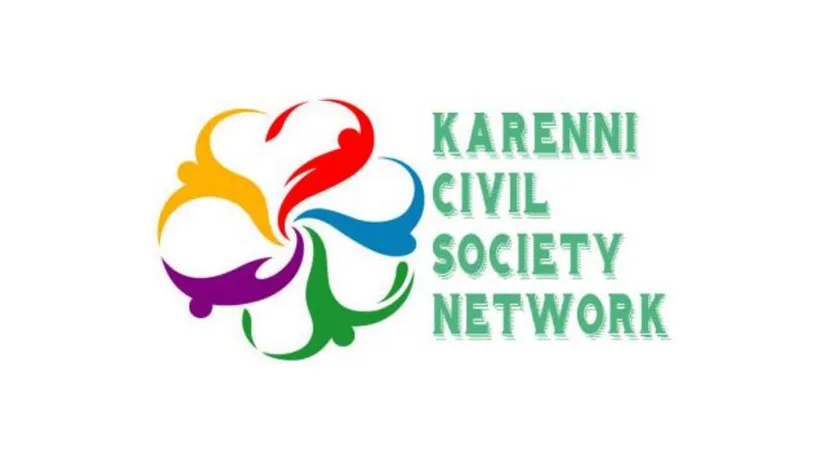
A briefing paper by the Karenni Civil Society Network (KCSN)
Summary
It has been over eight years since the Karenni National Progressive Party (KNPP) signed a bilateral ceasefire agreement with the Burmese government in the hope of entering into political dialogue towards a new federal constitution which could bring peace. However, dialogue has yet to take place, and the Burmese government and their military have instead exploited the ceasefire to sideline the KNPP and expand control over Karenni State, seizing lands and natural resources from the Karenni people and selling them off to crony and foreign investors.
This process has continued during the past two years. In 2019, the Burma Army seized 1,500 acres of indigenous farmlands to expand their infantry and artillery battalion bases in Loikaw and Demawso townships. 41 farmers who protested against this were charged under criminal laws, and ten imprisoned.
Despite the Burma Army’s declared unilateral ceasefire during the Covid-19 pandemic, it has continued provocative troop movement and aggression in Karenni State, pushing for the building of a strategic mountain road from Pasaung to Toungoo across KNPP territory, where KNPP and local communities are preparing to establish a protected peace park. In May 2020, unauthorized entry by Burma Army troops into KNPP territory in Shadaw led to an armed clash, killing a civilian driver forced to work for the Burma Army. In August 2020, Burma Army troops burned down a KNPP camp in Nam Kit, Pasaung township.
Blatantly violating their “Leaving no-one behind” policy in dealing with Covid-19, the government in August 2020 ordered the KNPP to dismantle all 20 of their Covid-19 monitoring checkpoints across Karenni State, claiming they were a “burden” for the local people. While there were no Covid-19 cases detected in Karenni State during the first wave of the pandemic, by the second week of December 2020, fifty-five cases had been detected.
The government has pushed ahead with top-down “development” projects, ignoring communities’ own environmental protection initiatives. In 2019, the Naypyidaw government Forestry Department confiscated 125 acres of land in Pasaung township to plant teak trees for commercial timber production within a new “forest preservation area.” The government is planning to expand the project this year by a further 500 acres, including local villagers’ farmlands, watersheds and forests around Ro Hso Mountain, an area rich in biodiversity, which has been recognized since 2010 by the KNPP and local villagers as a community forest area, with strict rules against logging, mining and hunting.
Since last year, the Napyidaw government has also permitted several harmful Chinese-invested resource extraction and infrastructure projects to proceed against the wishes of local communities. These include an expanded tin and tungsten mine in the Mawchi area, financed by the Chinese company Aik Wan. A local youth trying to take pictures of the mine in September 2020 was beaten up by the KNSO government militia who are the nominee owners of the mine.
Since July 2019, the Chinese Global South Industrial Company has begun construction of a mineral refinery north of Loikaw, in a USD 50 million joint venture which will refine locally mined tin and tungsten. 1,200 residents of nearby Nwa La Boe village are fearful of air pollution and water contamination from the plant.
Despite repeated local protests against large dams, the NLD government has also allowed China’s TBEA Co. Ltd. (based in Xinjiang province) and Khin Maung Nyunt company to start surveys for a 150 megawatt hydropower dam project planned on the Nam Thabet River, on the Loikaw township-Shan State border, which will potentially impact over 10,000 villagers. The companies have tried to convince KNPP to accept the project by suggesting it will be funded under the government’s Covid-19 Economic Relief Plan.
The Burmese government’s ongoing military expansion and aggression in Karenni State, and plunder of the Karenni people’s land and resources before peace talks have even begun, expose the insincerity of their current “peace process”.
In order to achieve peace, KCSN calls on the Burmese government and military to end their aggression, withdraw troops from ethnic areas, and start inclusive political dialogue immediately with all ethnic armed groups to establish a genuine federal democratic union. Until then, all resource extraction and mega-development projects must be stopped.
KCSN also urges international donors to suspend all investments and loans to the Burmese government until there is a genuine federal democratic union, and to provide cross-border humanitarian aid to ethnic communities.
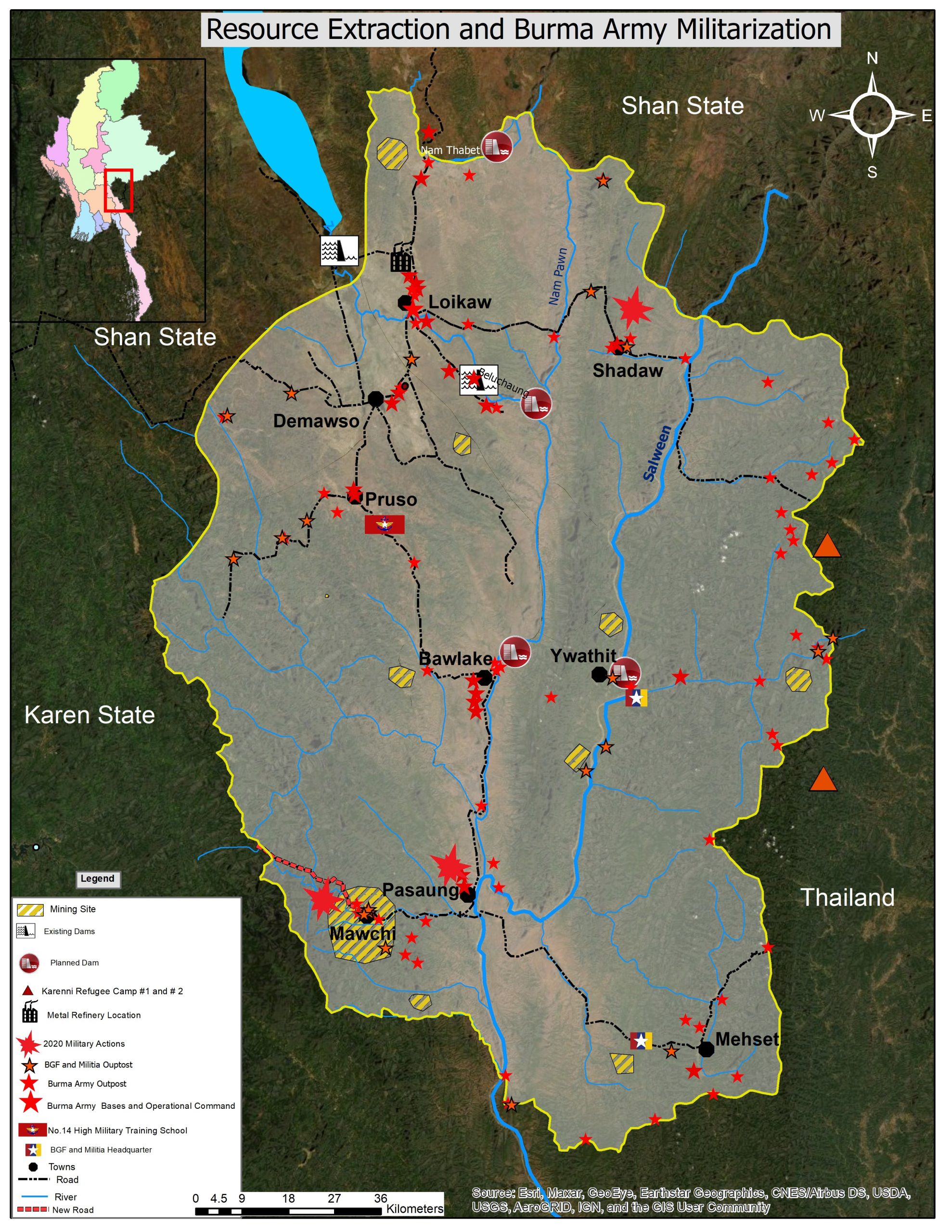
Introduction
The last KCSN analysis paper “Ongoing Burma Army logging threatens peace efforts in Karenni State,” published in 2018, documented the killing of three KNPP soldiers and one civilian following the search of illegal logs being transported on Burma Army trucks at a KNPP check point. This incident caused serious tension between KNPP and Burmese government troops. However, until today the Burma Army has failed to hold anyone accountable for this extrajudicial killing.
Such incidents, as well as ongoing offensives and crimes by the Burma Army in other parts of the country, have made the KNPP increasingly disillusioned with the government’s peace process and unwilling to sign the Nationwide Ceasefire Agreement (NCA). Other obstacles to signing the NCA are the non-inclusion of all ethnic armed groups, and the strait-jacketing of all policy proposals within the unitary 2008 Constitution, which will never address the aspirations of the ethnic peoples for a genuine federal union.
The central government’s authorization of mega-projects in Karenni State against communities’ wishes and enactment of laws such as the Vacant, Fallow and Virgin Land Law, facilitating confiscation of indigenous, customarily managed farmlands in Karenni State, are also eroding KNPP’s trust in the peace process.
This briefing paper provides an update on the conflict situation in Karenni State, examining and mapping recent developments related to militarization and resource extraction by the Burmese government. It also provides a reality check for the government’s claims to be “Leaving no one behind” in responding to Covid-19.
KCSN hopes that this analysis will feed into consideration by all stakeholders on how to move ahead towards a sustainable federal solution to the decades-long conflict in Burma.
1. Provocative Burma Army troop movement and aggression during their Covid 19 “unilateral ceasefire”
Since May 10, 2020, the Burma Army has supposedly been implementing a unilateral ceasefire throughout the country (except where “terrorists” are operating) to focus on combating the Covid-19 pandemic. However, during the Covid crisis, the Burma Army has continued provocative troop movement and aggression against the KNPP, pushing for the building of strategic roads through KNPP territory.
On May 16, 2020, 20 Burma Army soldiers from LIB 530 based in Shadaw were travelling in trucks to Tin Loi, 30 miles away from Shadaw. On the way, eight miles from Shadaw, they entered an area restricted by KNPP troops, where, according to an agreement between both parties, the Burma Army is not allowed to patrol. However, ignoring the agreement, the Burma Army entered the restricted area, causing fighting to break out. A road construction company driver, who was forced to drive for the Burma Army, was killed during the incident.
On May 29, 2020, Burma Army LIB 72 from Lawpita came into Mawchi, replacing LIB 135. On June 4, 2020, LIB 72 troops gave orders to a headman and an assistant pastor from Kaw Tu Der village near Mawchi to come and meet with them in Mawchi. The troops then forced them to serve as guides as they patrolled into the KNPP-controlled area of District 2 in Pasaung township. These troops did not inform or ask permission from local KNPP officers when entering the KNPP area. KNPP had to exercise restraint to avoid clashing with them.
On August 17, 2020, the commander of the Bawlake Tactical Command led 50 soldiers on patrol and burned down a KNPP military base in Nam Kit, in Pasaung Township. KNPP troops retreated in order to avoid fighting.
During 2020, the Burma Army has also repeatedly requested the KNPP to allow them to rebuild the old mountainous car road from Mawchi through KNPP District 2 to Toungoo, which also passes through the KNU 2nd brigade area. This is a very strategic road, enabling quick troop deployment from Toungoo, and also a shorter route to transport natural resources such as timber, wolfram, tungsten and other minerals from Karenni State via Toungoo to Yangon and Naypyidaw. The KNPP has continued to refuse permission to rebuild the road, which cuts through a forested mountainous area, where the KNPP administration and local communities are planning to establish a “peace park,” modeled after the Salween Peace Park in Papun District. The planned peace park includes the whole of Pasaung township, and parts of Bawlake and Pruso townships, covering about one-fifth of the total area of Karenni State. It will be contiguous to the existing Salween Peace Park to the south. The park will be called the Thaw Thi Phwaw Ghaw Peace Park, after the Thaw Thi Kho mountain which is the highest peak in the area.
2. Closure and destruction of Karenni community Covid-19 checkpoints
From February to May 2020, during the first wave of the Covid-19 pandemic, the KNPP’s health department — the Karenni Mobile Health Committee (KnMHC) — set up twenty Covid-19 response check points, on roads in remote areas controlled by KNPP as well as in mixed administration areas. At the checkpoints, KnMHC staff from the local community checked temperatures and provided Covid-19 prevention information. KNPP troops provided security.
However, in August 2020, the Kayah State NLD government, through the General Administration Department, instructed the respective village tract administrators to order all the KnMHC health checkpoints to be shut down, saying they were placing a “burden” on local people and were operating without the permission of the government. By the end of August, KnMHC was forced to dismantle all 20 of these checkpoints, and restrict their Covid-19 monitoring activities to KnMHC’s mobile health clinic areas in KNPP territory.
The KnMHC’s Covid-19 checkpoint at Nam Kit was burned down by the Burma Army when the KNPP base there was destroyed on August 17.
During the first wave of Covid-19, Karenni State was the only region of Burma where no cases were found. By early December 2020, three months after the second wave began in Burma, twenty seven positive cases had been recorded in Karenni State. In order to protect local communities from this second wave, in early November, KnMHC re-established nine of the original checkpoints which were ordered shut by the government authorities. The KNPP liaison office in Loikaw sent a letter to the government authorities informing them of this, but received no response.
During the first wave of the pandemic, local CBOs and CSOs helped provide food for people staying in quarantine centres in Loikaw: the Loikaw University campus, Loikaw Nursing Centre, and Loikaw Teacher Training Centre. During the second wave, those in staying in quarantine centres have been charged 17,000 kyat a day to cover the costs of their food. Locals are wondering why the state is not able to cover these costs, especially as the government is receiving so much international aid to support their Covid response.
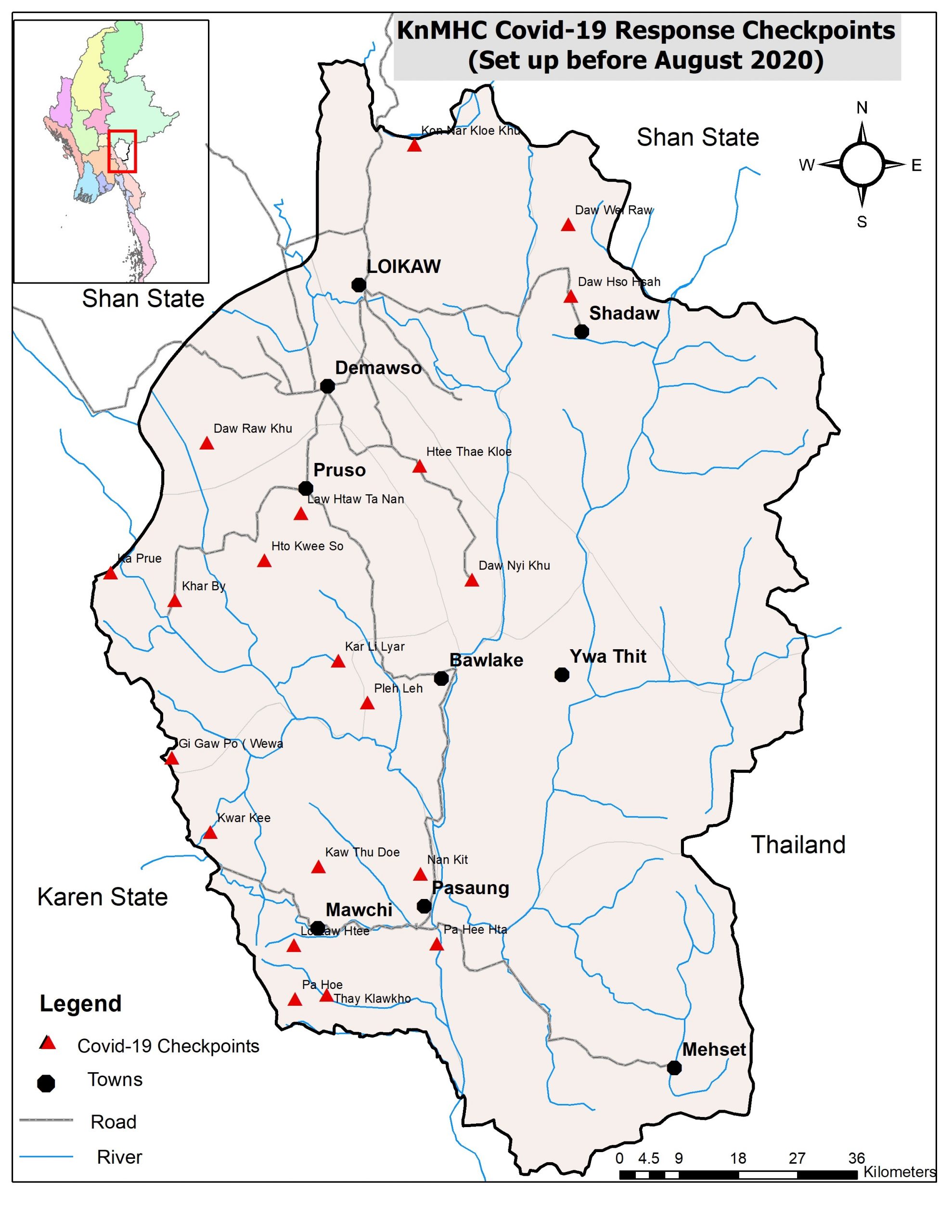
3. Ongoing confiscation of ancestral farmlands
Since KNPP signed a ceasefire agreement with U Thein Sein’s government in 2012, there has been ongoing confiscation of land from indigenous farmers in Karenni State. Farmers attempting to protect their lands have been charged under the law, both under U Thein Sein’s government and the NLD government, Many of them have ended up in court and been imprisoned. The main laws used to charge the farmers have been:
- Article 6/1 of the Public Property Protection Act, related to misappropriation or mischief in respect to any public property
- Article 447 of the Penal Code: criminal trespass
- Article 427 of the Penal Code: damage to property
- Article 353 of the Penal Code: preventing a public servant from discharging their duty
- Article 294 of the Penal Code: causing public disturbance with offensive language
These laws have continued to be used during 2019 and 2020 to punish farmers who have tried to stop their ancestral farmlands from being confiscated.
A. Land confiscation for Burma Army expansion in Loikaw and Demawso townships
In 2019, Burma Army Artillery Battalion 360 confiscated 200 acres of agricultural lands from villagers of Daw Hso Shay, Chauk Maing (6 Miles) village tract, Demawso township, for the expansion of their military base. In the same year, Burma Army Artillery Battalion 356, Light Infantry Battalion 250 and Infantry Battalion 261 confiscated 1,300 acres of land from villagers of Daw Mu Klar in Loikaw township, for expansion of their bases.
Hundreds of farmers from these two villages staged plough demonstrations to regain their agricultural lands from the army. As a result, 41 farmers who led the demonstrations were charged under the five articles listed above, and over 10 farmers were imprisoned in Loikaw’s prison in late 2019, while others faced trial outside prison. The detained farmers were released from prison in early 2020, but the Burma Army appealed against the court verdict.
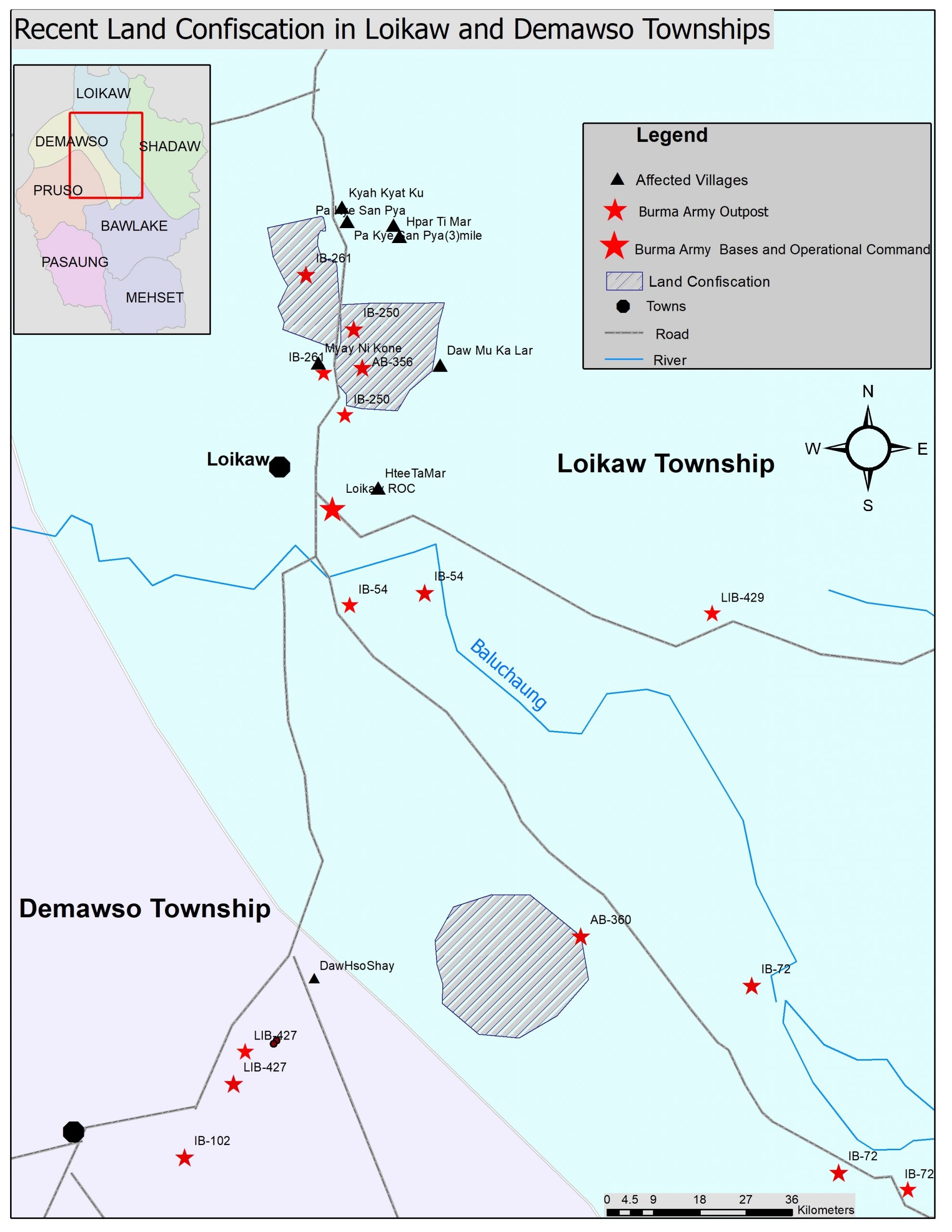
Fortunately, with the help of lawyers, the court was persuaded to drop all charges against the farmers on March 13, 2020, but the 41 farmers had to attend court 41 times during a 10-month period until the charges were all dropped. This consumed a huge amount of time and money for the farmers. Those who were bailed out also had to pay the bail fee.
Even though the farmers have all now been freed, they have lost their ancestral agricultural lands, on which they have relied for generations.
KNPP liaison officials in Loikaw tried to negotiate with the authorities to protect the farmers against the charges, appealing to the government’s National Reconciliation and Peace Centre in 2019, and also the Burma Army’s Regional Operations Command in Loikaw in February 2020, but to no avail. They were told by the Burma Army that it was the farmers’ own fault for choosing to protest, instead of observing the law.
On April 25, 2020, the government told the farmers whose lands had been confiscated in Daw Hso Shay, Demawso Township, that they had been given 45 acres of land near Daw Pu village, Daw Pu village tract, Demawso Township, to replace their confiscated land. However, this land is 24 miles from their village and is already customarily owned by Daw Pu villagers, who do not want to give up their land. This offer has only ended up creating conflict between farmers of different villages, and shows the government’s incompetence in addressing land issues in ethnic areas.
It is urgently needed for the government to start recognizing the customary land management system practiced by indigenous people.
B. Land confiscation for government forestry business in Pasaung township
In 2019, the Naypyidaw Government Forestry Department confiscated 125 acres of land in Pasaung township, including the agricultural lands of eleven families from Nam Kit village, in order to plant teak trees for commercial timber production within a new “forest preservation area.”
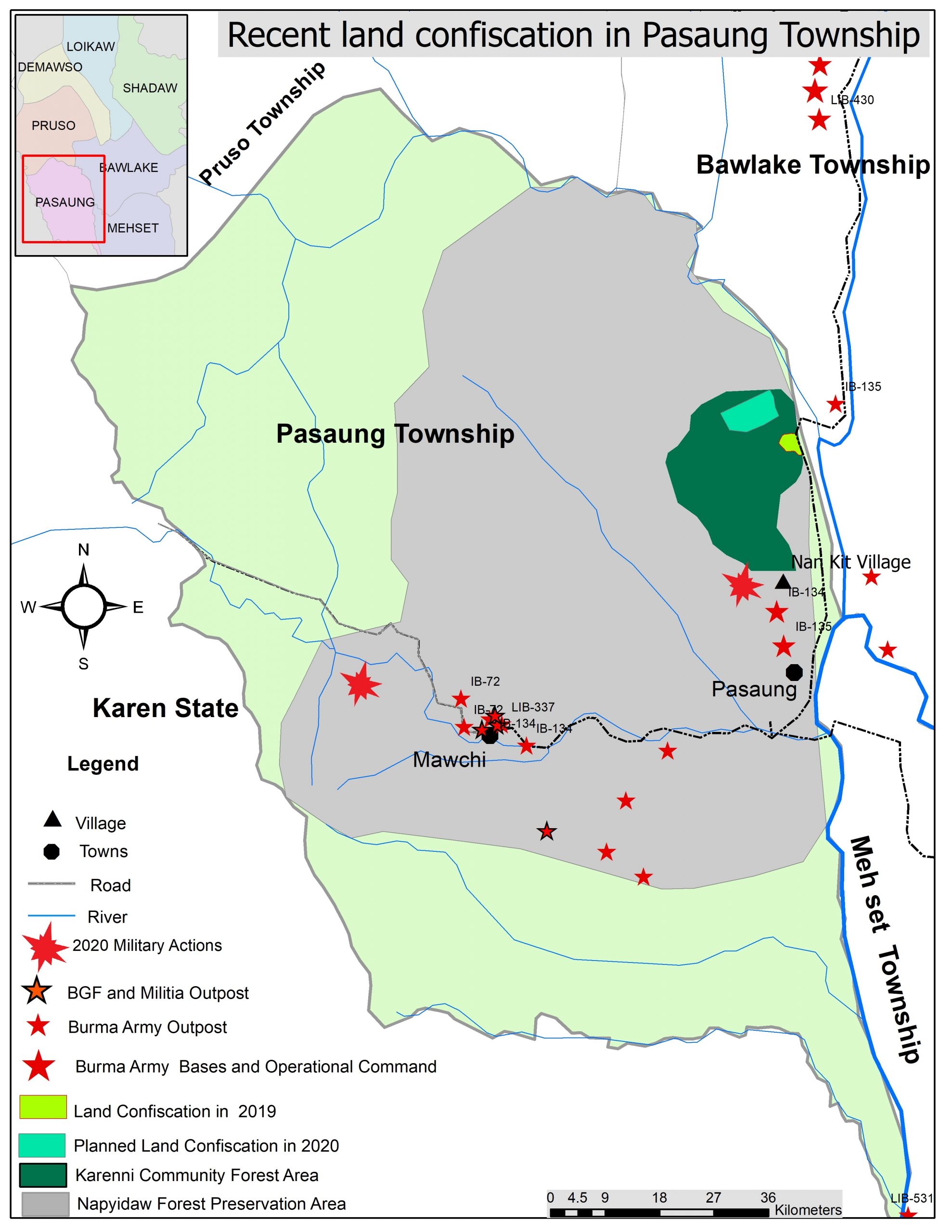
In 2020, the government announced it wanted to expand this teak plantation project into another 500 acres of land near Nam Kit village, including villagers’ farmlands, animal grazing lands, watersheds and village forests at the bottom of Ro Hso Mountain.
The Ro Hso forest area (and the Ler Mu Kho forest area to the west) lies in KNPP’s District 2, and in 2010 was recognized by the KNPP and local villagers as a “community forest area” (with local regulations against damaging logging, mining and hunting of wildlife) before the signing of the ceasefire in 2012. Rare wildlife, such as tigers, antelopes, deer, boars, and peacocks, is still found in the Ro Hso Mountain forest area. In 2017, this forest area was more precisely demarcated by KNPP and local communities using GPS technology.
When the Naypyidaw Forestry Department came this year to seize 500 more acres from the villagers in the vicinity of the Ro Hso forest area, the Nam Kit villagers asked help from KNPP to help protect their lands. The KNPP until now has not given permission to the government to seize this land.
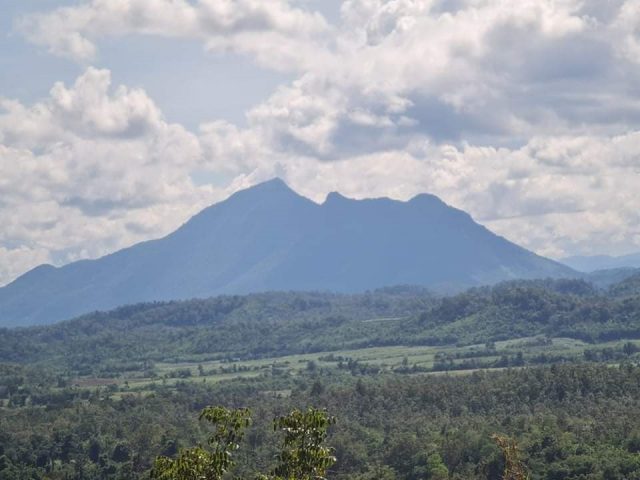
Ro Hso Mountain, where Karenni community forest has been established
4. Harmful resource extraction and mega-projects proceeding without transparency
During the past year, the Napyidaw government has permitted several harmful resource extraction and mega-projects to proceed against the wishes of local communities. These projects are all invested in by Chinese companies.
A) Expansion of Mawchi tin and tungsten mines
The Naypyidaw government is continuing to allow the expansion of tin-tungsten mining operations in Mawchi, despite long standing community concerns about the social and environmental impacts of the mining, and despite plans by the KNPP administration and local communities to establish the Thaw Thi Phwaw Ghaw Peace Park in the area.
The Kayah Ngwe Kyel mining company, owned by one of the government militias, the Karenni National Solidarity Organization (KNSO) is cooperating with Chinese investors (from the Aik Wan mining company) to mine tin and tungsten in a new location at Taw Meh Kee, near Kaw Tu Der village, about three miles north of the existing Mawchi mining area. KNSO troops are strictly guarding the mining site, and blocking outsiders from accessing the area, likely to hide the presence of Chinese personnel at the site (as the official mining permit belongs to the domestic company, Kayah Ngwe Kyel, not to the Chinese company). The tin and tungsten are being trucked to Loikaw and then to the China border.
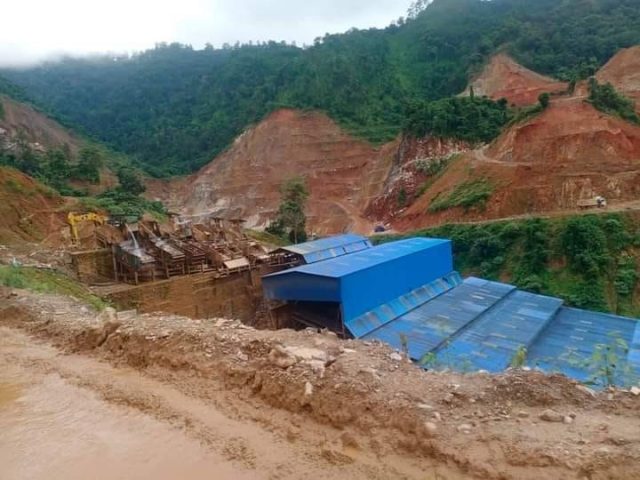
New mining site at Taw Meh Kee, operated by KNSO-owned Kayah Ngwe Kyel company and Chinese Aik Wan company (Credit; KnIC)
On September 5, 2020, three local youth went to the Taw Meh Kee mining site, and took pictures of the operations. One of the youth, from nearby Bu Law Per village, was arrested and beaten by KNSO soldiers. The youth’s parents tried to complain to the KNSO soldiers, but the soldiers just told them to go and talk to their leaders.
B) Mineral refinery under construction near Loikaw
Since late July 2019, 113 acres of land near Nwa La Boe village, at Loikaw’s industrial zone II, two kilometers north of Loikaw, have been granted to construct a mineral refinery, which is a US$ 50 million joint venture between China’s Global South Industrial Company (investing 90%) and Myanmar’s Yadanar Kaday Theik Co., Ltd. (investing 10%). The land will be rented by the companies at an annual cost of 71.43$ per acre, totaling 8,071.43$ per year, under a 50-year permit, approved by the Directorate of Investment and Company Administration (DICA)
The Global South Industrial Company is under the Hunan Global South Co. Ltd, based in China’s Hunan province.
Raw tungsten and tin will be transported to the refinery from mines in the Tigyit and Kassan areas, in Tigyit village tract of Pekhon Township, Shan State, bordering Karenni State. It is aimed to produce 2,000 tons (15,000 US $/ ton) of refined metal bars, 2,000 tons (18,000 US $/ton) of refined wires and 1,000 tons (16,500 US $/ton) of other products per year at the refinery, which will be exported mainly to China. It is expected that tin and tungsten mined in Mawchi will also be brought to the refinery.
Construction at the project site has been underway since late July 2019, and is expected to be finished by the end of 2020. However, local communities were not consulted, and have received little information about the refinery. They are worried about environmental and health impacts, from air pollution and chemical contamination of underground water sources and streams, which flow into the Baluchaung and Pawn Rivers.
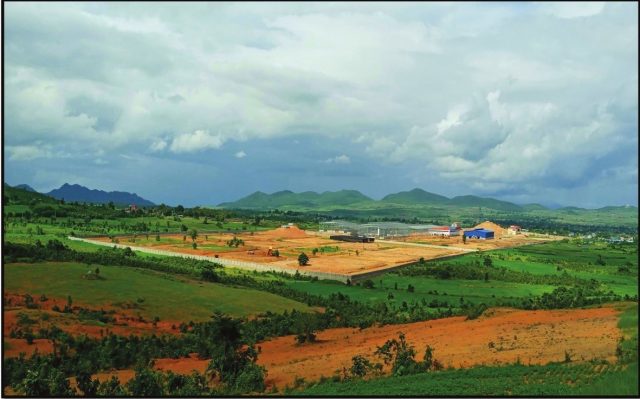
Mineral refinery construction at Nwa La Boe (Credit: KMIW)
Nwa La Boe village, next to the metal refinery, was originally set up by Lawpita villagers forcibly relocated by the Burma Army in 1989 in a security clearance operation around the Lawpita hydropower plant. In 1996, when the Burma Army forcibly depopulated two-thirds of the area of Karenni State in a large-scale anti-insurgency campaign, more villagers were relocated to Nwa La Boe. Today, Nwa La Boe has about 150 households, with a population of about 1,200. Already uprooted from their ancestral lands, they are now facing threats to their health and environment from a metal refinery which is proceeding against their rights to free, prior and informed consent.
C) Surveying underway for Nam Thabet hydropower project
In January 2010, an MOU was signed by the previous Burmese military regime and China’s Datang company to build three dams in Karenni State, including the giant Ywathit dam on the Salween river, and dams on the Pawn and Nam Thabet rivers. The local Burmese partner in the MOU was the Shwe Taung conglomerate. The construction of these projects has been delayed due to protests against the projects by civil society groups and local communities, but the government and various companies have been continuously searching for opportunities to continue the projects.
The status of the original MOU with Datang company is unclear, but the NLD government has now allowed China’s TBEA Co. Ltd. (formerly Tebian Electric Apparatus) and Khin Maung Nyunt Trading Co. Ltd to proceed with a hydropower dam project on the Nam Thabet river, which is located on the Loikaw township-Shan State border. These companies conducted a pre-feasibility survey for the project during March 16-22, 2018, with permission from the Kayah State government and after persuading the KNPP to allow them to carry out the survey.
Under the TBEA Company’s plan, the Nam Thabet dam project will produce 150 MW of electricity, more than the 110 MW originally planned by the Datang Company.
TBEA Co. Ltd., an engineering and electrical equipment manufacturing company, is based in Changji, Xinjiang province, in the far west of China, where the Uighur Muslim population is facing severe repression by the Chinese government. Overseas investments by TBEA Group Co. Ltd include a $2.3 billion joint venture with the Bolivian government in 2019 to mine and industrially manufacture lithium.
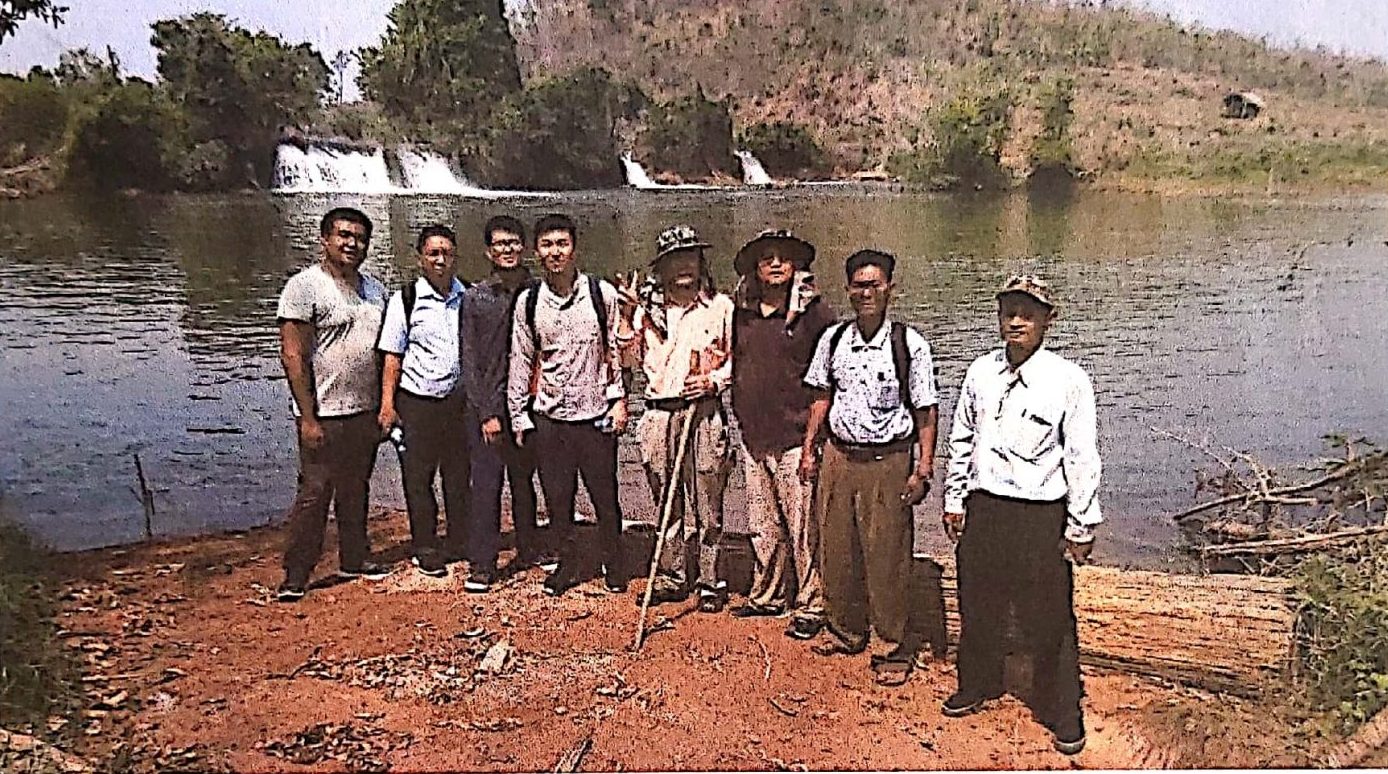
Surveyors from Khin Maung Nyut Co. Ltd and TBEA Group Co. Ltd at Nam Thabet River in 2018
On April 27, 2020, the Kayah State government informed the KNPP liaison office in Loikaw that Myanmar Geo Specialist Co. Ltd had been allowed by the Ministry of Electricity and Energy to conduct a geological survey for the Nam Thabet dam from the second week of March to the end of September 2020. On June 19, 2020, the KMN Company visited the Kayah State government to follow up on this, and on June 22 wrote a letter to KNPP to persuade them to allow the survey, mentioning they were hoping to take advantage of the government’s 2-billion dollar Covid Economic Relief Plan (CERP), which will fund “fast-tracking” of large-scale infrastructure projects.
Due to the concerns of local villagers, the KNPP has not agreed to the geological survey, and on September 21, 2020, sent a letter to the Naypyitaw NLD government requesting the cancellation of the Nam Thabet dam project.
Potential impacts of the Nam Thabet hydropower project
There are 27 villages (23 villages in Loikaw Township in Karenni State and 4 villages in Hsi Hseng Township in Shan State) with a total estimated population of 10,359 population, who will potentially be impacted by the Nam Thabet hydropower dam project.
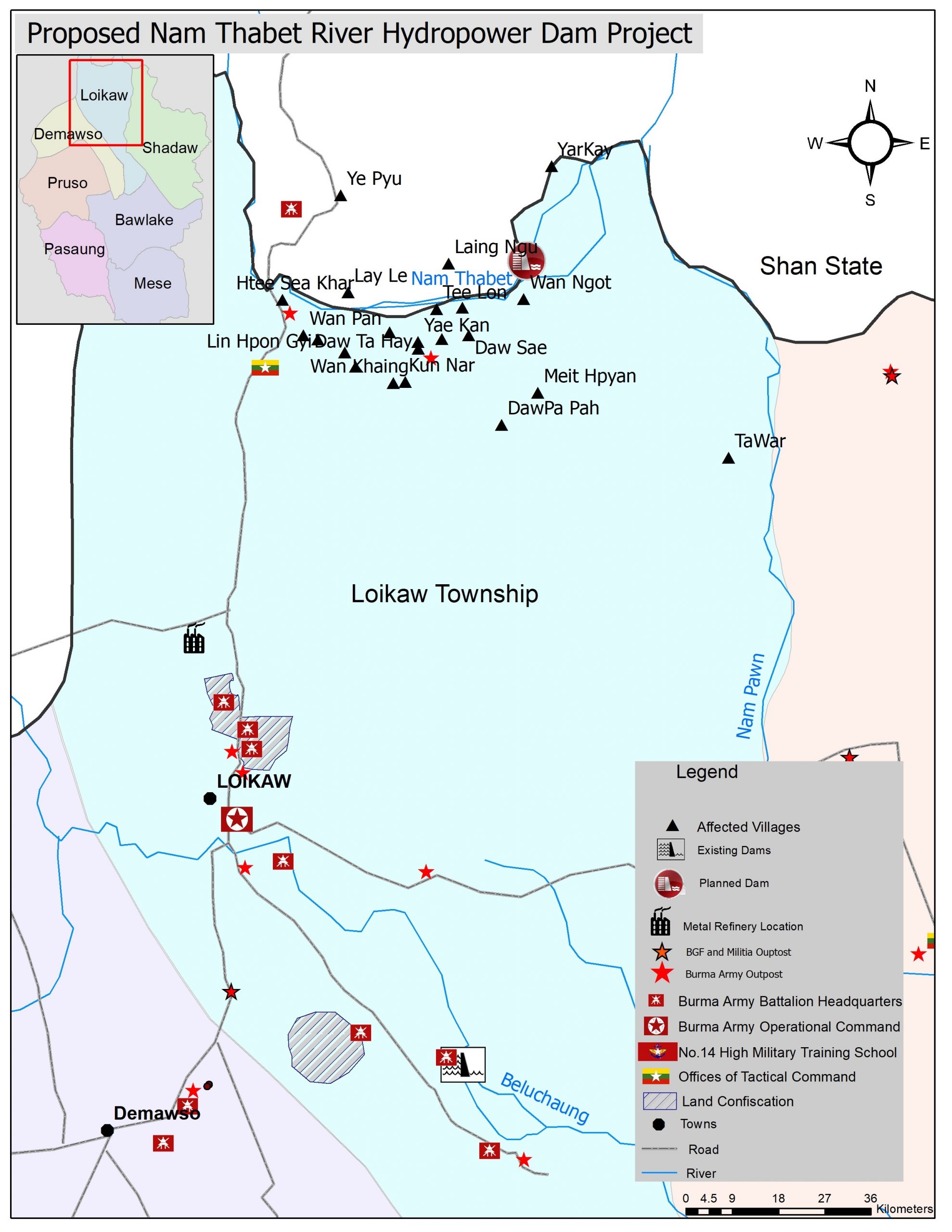
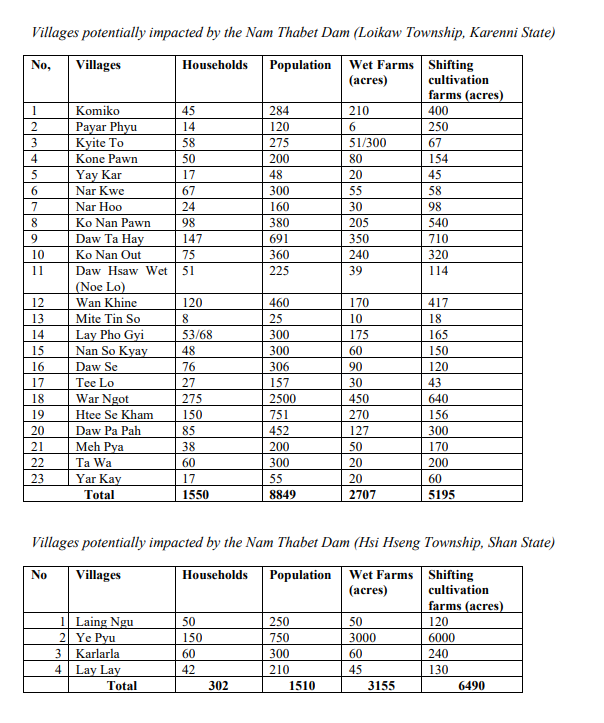
The local villagers are all farmers, relying closely on their natural environment. Construction of the large-scale hydropower project and related infrastructure will inevitably impact the ecology of the surrounding area, destroying forests and wildlife habitat.
The damming of the Nam Thabet River will also disrupt fisheries, which are a vital resource, providing food security and livelihoods for thousands of people, many of whom have limited opportunities to find alternative sources of food or income. Even though the dam will be a “run-of-the-river” project, promoted as having limited impact on fisheries, a previous “run-of-the-river” project in northeast Thailand, the 136 MW Pak Mun dam, completed in 1994 with support from the World Bank, completely blocked the migration of fish, disrupting the fishing livelihoods of over 20,000 villagers.[1]
Locals also fear that the scenic Nam Thabet waterfalls (which locals call Htee Sel Khar), about five miles from the proposed dam site, will be affected by the dam. The waterfalls are a well-known tourist attraction in Karenni state, enabling local villagers to earn an income from visitors, especially during the Thingyan water festival in summer, when thousands visit from around Burma.
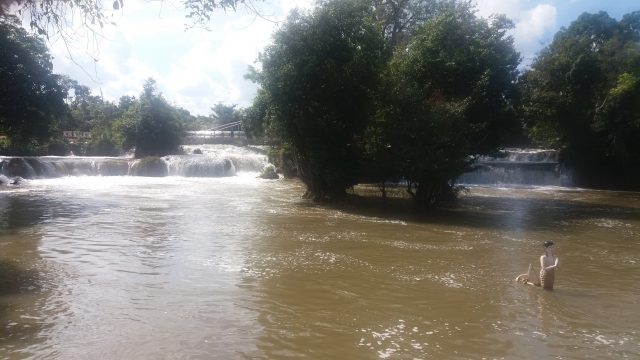
Nam Thabet waterfalls (photo by KCSN)
Another harmful impact of the project will be the increased presence of Burma Army troops to guard the dam, with increased security risks for local civilians. The Karenni people have bitter experience of human rights violations by Burma Army troops deployed to secure the Lawpita power plant, Burma’s first large hydropower project built decades ago. Thousands of land mines were planted by the Burma Army around the project, causing injury and death of civilians. If villagers’ livestock accidentally detonated a mine, they had to pay a fine to the military.
NCA signatory PNLO promoting Nam Thabet and Pawn River dam projects against wishes of impacted communities
The Nam Thabet river forms the boundary between northern Loikaw township and Hsi Hseng township, which is in the Pa-O self-administered zone. Even though Hsi Hseng villagers will also bear the negative impacts of any dam on the Nam Thabet, the Pa-O National Liberation Organisation (PNLO), which is a signatory of the Nationwide Ceasefire Agreement (NCA), is promoting the damming of the river.
In a letter to the Peace Commission dated October 19, 2019, under the name of the Pa-O Peace and Development Committee (PPDC), the PNLO urged the Naypyidaw government to proceed with building the Nam Thabet dam (although they described the dam as producing 110 MW, the figure originally planned by Datang company), as well as a 30 MW dam on the Pawn River, to be constructed by M.Y. Holding Company and HTCT Investment Co. Ltd (part of the Shwe Taung conglomerate).
On April 9, 2020, the PNLO wrote another letter to Daw Aung San Suu Kyi, State Counsellor and Chair of the National Reconciliation and Peace Centre, calling for the construction of four dams “in the Pa-O self-administered zone” producing 410 MW of electricity, including the Nam Thabet dam (110 MW) and a 30 MW dam on the Pawn River.
The PNLO mentioned an MOU already signed on July 9, 2019 between the Shan State Government and the M.Y Holding Company, to build a 30 MW dam project on the Nam Pawn river at Naung Htaung village in the PNLO area. In their letters they said they have been requesting the M.Y Holding Company CEO U Ye Htut, the steering body of the Pa-O self-administered zone and the PPDC to cooperate on proceeding with the Nam Pawn dam.
The PNLO are promoting these projects under the heading “Development for Peace and Business for Peace” according to Article 25 (b) of the NCA agreement, whereby mega projects can proceed in ceasefire areas if they adhere to EITI (Extractive Industries Transparency Initiative) procedures and have consent from local affected communities and respective Ethnic Armed Organizations.
The Nam Thabet dam will impact thousands of Karenni State residents. Likewise, any dams on the Pawn River in Shan State will have far-reaching downstream impacts on Karenni people, as the Pawn River traverses almost the entire length of Karenni State. Thousands of Karenni people in Bawlake came out to demonstrate against the Pawn River dams in October 2016.
Therefore, the PNLO is already violating the NCA agreement by pushing ahead with these dams without the consent of affected communities. But regardless of the NCA, the PNLO should not be promoting such mega-projects in contested ethnic areas before there is a negotiated political solution to the conflict, and a new federal constitution, devolving the powers of ownership, management and control over natural resources, and giving local communities the right to decide over their own development.
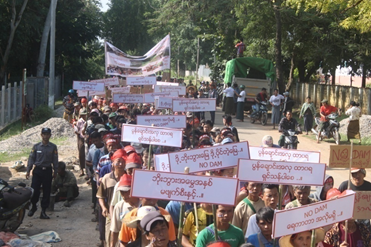
Protest in ancient Karenni capital Bawlake against Pawn River dams, October 2016
Conclusion and recommendations
The Burmese government’s ongoing military expansion and aggression in Karenni State, and plunder of the Karenni people’s land and resources, expose the insincerity of their current “peace process.” It is urgently needed for international donors to review their support for this failed peace process and start exerting meaningful pressure on the Burmese government to end Burma Army offensives throughout the country, pull back troops and start inclusive political dialogue with all ethnic armed organizations towards a new federal constitution.
This means ending “business as usual” in Burma and stopping injecting billions of dollars of aid into the central government – most recently towards their Covid Economic Relief Plan — as this is subsidizing and giving a green light to the Burma Army’s ongoing offensives and crimes in ethnic areas.
In order to achieve peace, KCSN therefore makes the following recommendations:
To the Burmese government
- To stop all resource extraction and mega development projects until there is a genuine peace accord signed by all ethnic armed groups, and a new federal democratic constitution is actualized in Burma.
- To order Burma Army troops in all ethnic areas to immediately stop land confiscation and return all seized lands to the local ethnic farmers who originally cultivated them.
- To withdraw all legal charges against farmers opposing unjust land grabbing.
- To withdraw Burma Army troops from ethnic areas, declare an all-inclusive nationwide ceasefire and begin political dialogue with all ethnic armed groups to establish a genuine federal democratic union in Burma.
To international companies
- To stop all investments until there is genuine peace, democratic change and a federal union established in Burma, as current investments are just benefiting the government and their military, enabling them to control and oppress the ethnic nationalities in Burma.
International donors
- To stop providing loans to the Burmese government until there is genuine peace, democratic reform and a federal union established in Burma, as these loans simply benefit the government and its military, enabling them to control and oppress the ethnic peoples in Burma.
- To provide humanitarian assistance cross-border, through respective ethnic organizations that will directly reach local communities.
[1] International Rivers website: https://www.irn.org/pakmun/
Announcements
21 May 2025
Open letter: Malaysia must lead ASEAN with principle, not hypocrisy, to address the Myanmar crisis

Progressive Voice is a participatory rights-based policy research and advocacy organization rooted in civil society, that maintains strong networks and relationships with grassroots organizations and community-based organizations throughout Myanmar. It acts as a bridge to the international community and international policymakers by amplifying voices from the ground, and advocating for a rights-based policy narrative.